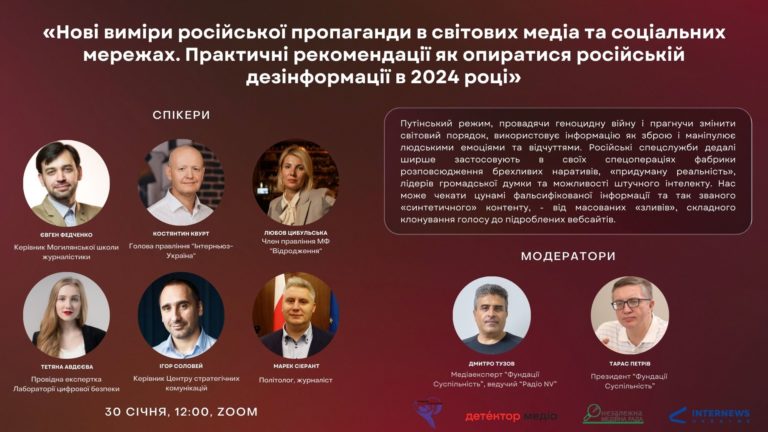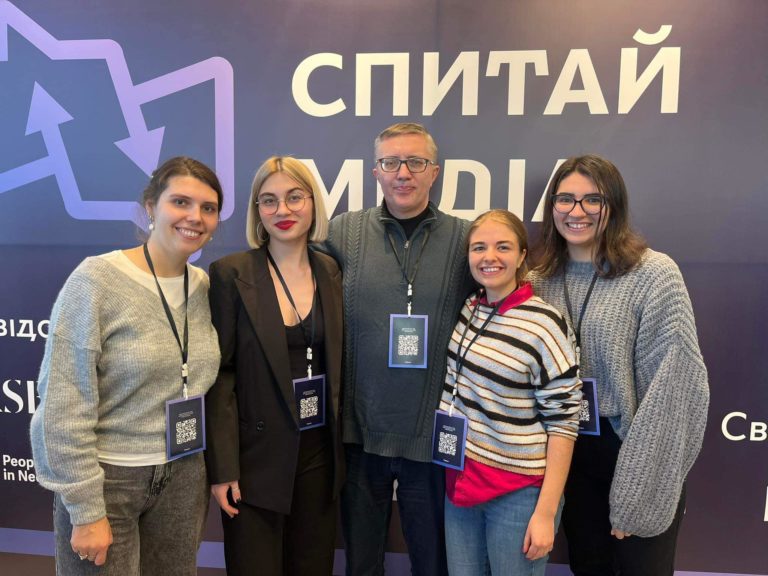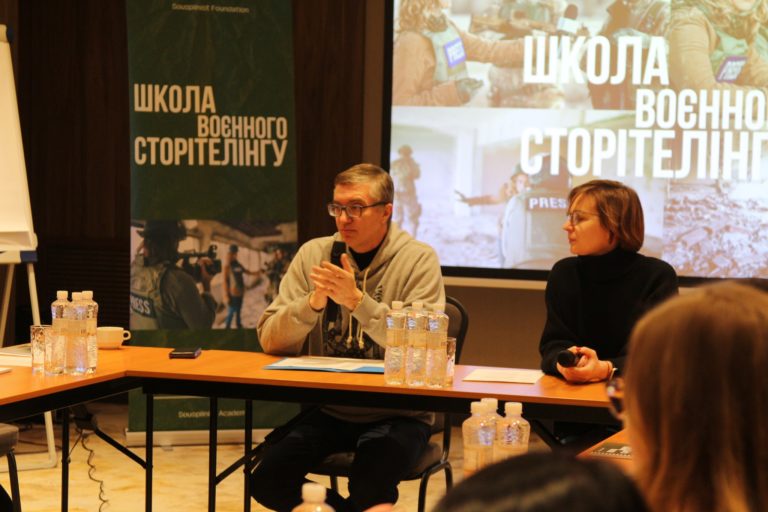In Kyiv, the “Wartime Media Challenges 2023” annual conference is taking place on August 25-26. We’ll tell you about the first day.
The event began with welcoming remarks. Christopher Atwood, Head of a group of advisors of Souspilnist Foundation, Marjorie Rouse, Vice President of Internews, and Taras Shevchenko, Deputy Minister of Culture and Information Policy, addressed the participants. They all emphasized the importance of journalists’ work during wartime, as it helps the world see the truth.
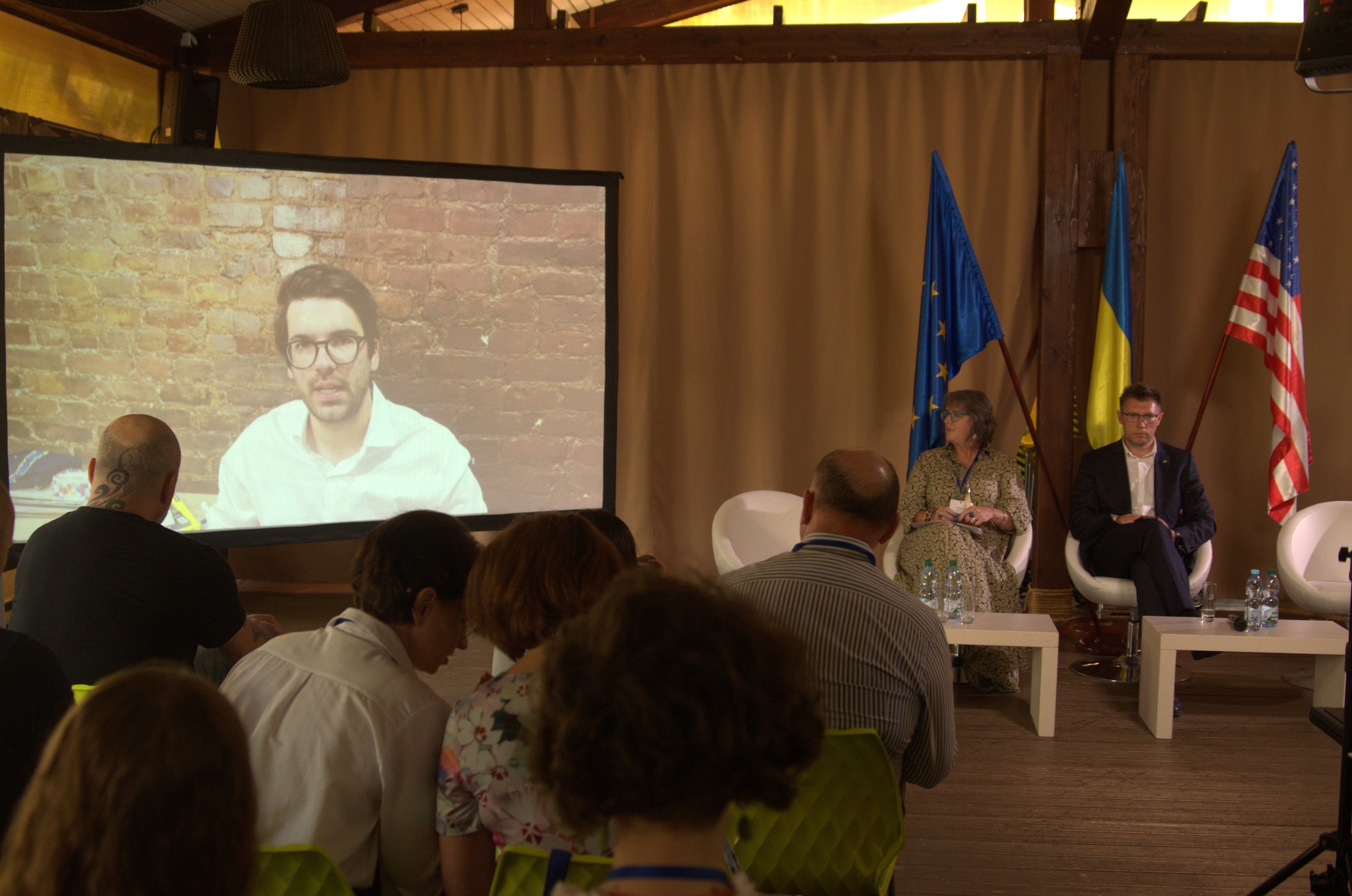
We need to create institutions that will work for solidarity among people. Right now, Ukrainians understand the importance of solidarity better than anyone. Every Ukrainian is working for victory, and the whole world sees it, which is why the whole world wants to help and work for Ukraine’s victory, Christopher Atwood emphasized.
There were many young journalists at the conference, including media interns from the Media Mobility Hub in Wartime. Marjorie Rouse addressed them, stating that in her opinion, the future of Ukrainian journalism lied with them.
“We believe that supporting young journalists is crucial for the development of the information environment,” Marjorie Rouse said.
We have all experienced that the war is a time of change, affecting all aspects of life. Many things have changed in the media industry as well. Journalists now face many new challenges.
“War challenges are a balance of freedom and responsibility. During wartime, there may be censorship, but it does not benefit the state. Therefore, we need to continue to find and maintain this balance,” emphasized Taras Shevchenko.
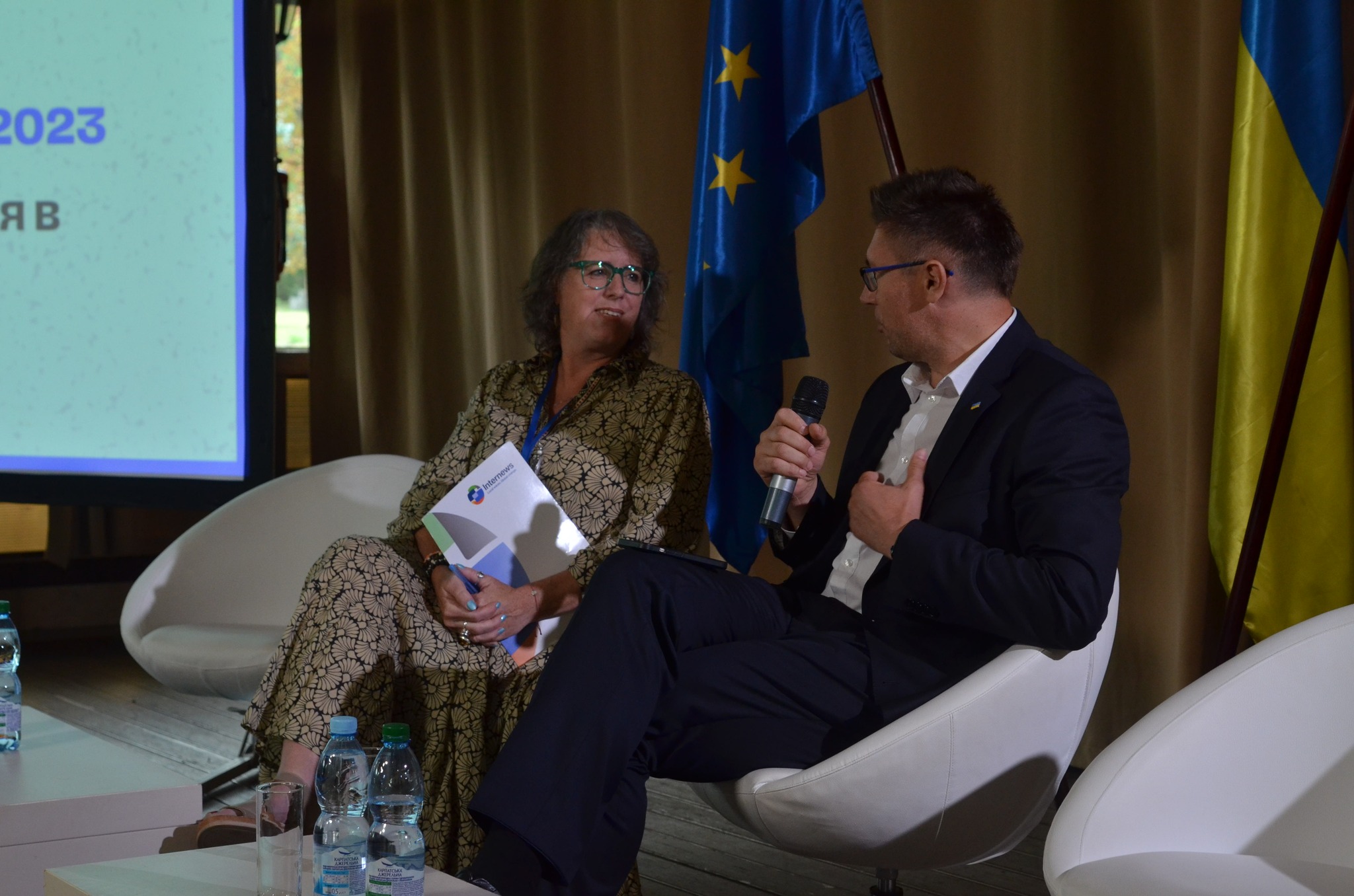
He also noted that Ukraine has been frequently featured in foreign media over the past year and a half. Therefore, journalists should be aware of what to show and how to convey to foreigners what is really happening in our country.
The first panel discussed “Media, modern communications, and the profession – insights from journalists serving in the Armed Forces.” Active service members from the Armed Forces of Ukraine who had previously worked as journalists shared their experiences. The panel included Zurab Alasania, a media manager and the first Chairman of the Supervisory Board of Suspilne; Vakhtang Kipiani, a journalist, publicist, historian, and chief editor of the “Historical Truth” website; and Andrii Andrushkiv, the host of the “Svitlo” program. They discussed the role of media during wartime, censorship, and the changes that await Ukrainian journalism after the war.
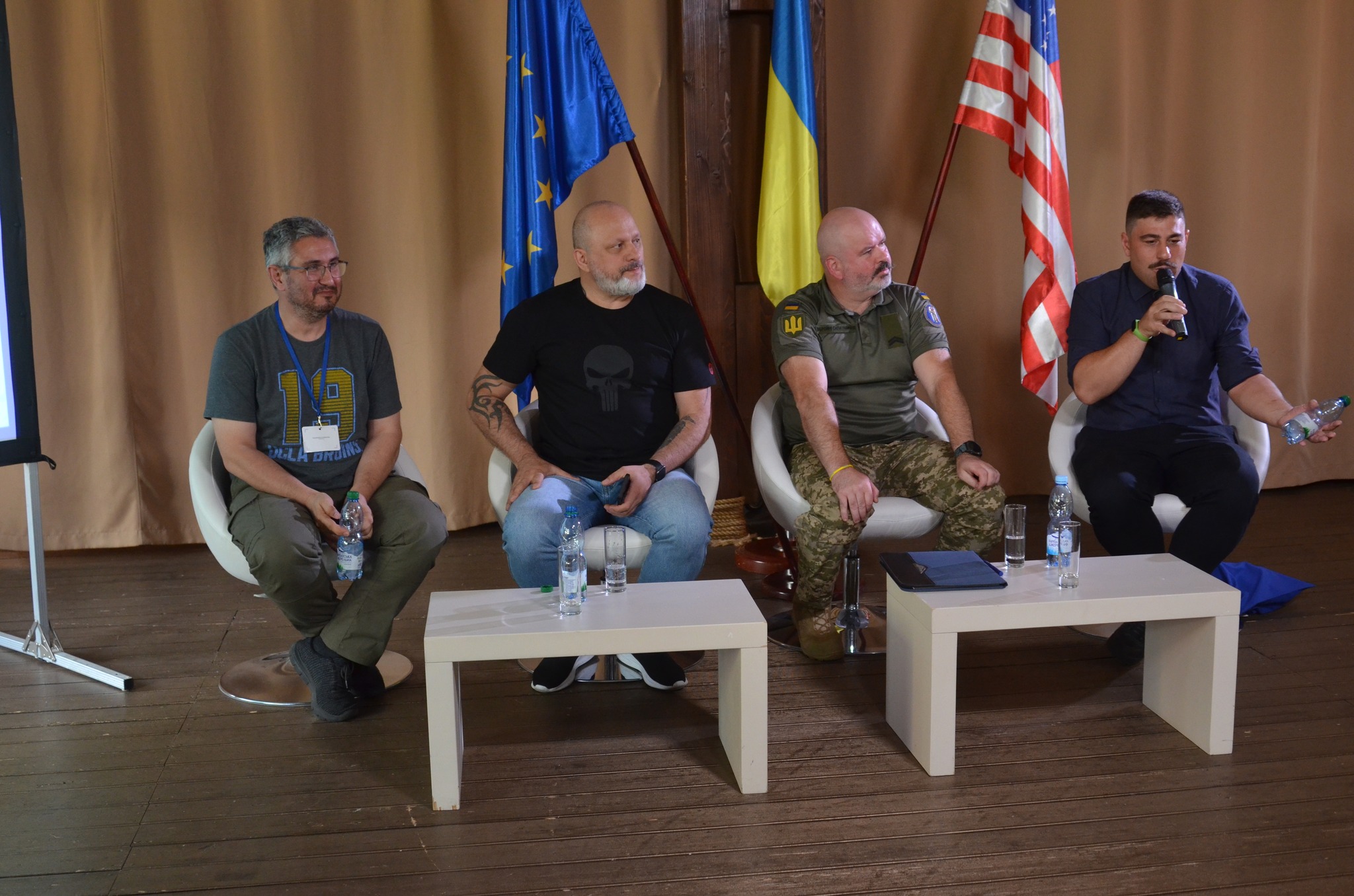
“We fell into a trap. We couldn’t help but idealize victory. We celebrated every small victory, and we demanded and expected new ones from the soldiers. Now we have to explain that we won’t all win tomorrow; this will take a long time. You can’t keep any community fueled by emotions alone,” noted Zurab Alasania.
“In my opinion, the problem with journalists was that, before the full-scale war, they didn’t highlight the experiences of the military enough. But now, over the past year and a half, journalists have grown ‘demons’ who talk about everything. These ‘demons’ have polluted people’s minds. Editors and journalists need to find more professional speakers, not just the most popular ones,” shared Vakhtang Kipiani.
“For me, the role of media is to provide a clearer and deeper picture than what social media offers. Reality is different from TikTok. You can’t fly around on a Ghost of Kyiv for long or ride on ‘Patron the Dog.’ The task of journalists is to find service members and reveal them more deeply: who is this infantryman, this artilleryman, this military medic. Make people in the city, region, and country know the heroes — know them by name, know their stories,” appealed to the audience Andrii Andrushkiv.
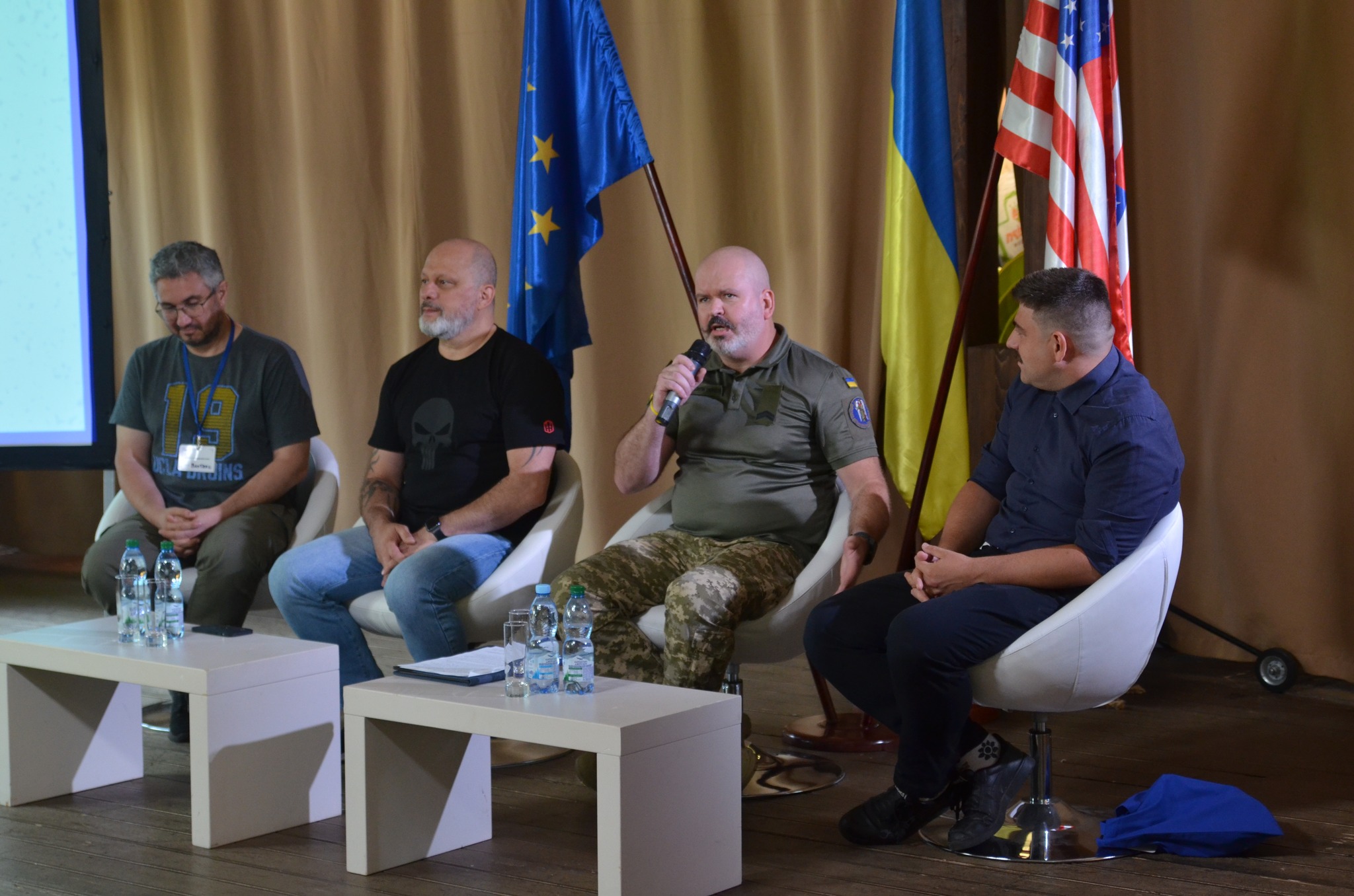
The second panel continued the discussion on the war but explored another aspect of it — media strategies. During the discussion, the participants talked about communication between the state and media, media literacy, issues of controlling Russian fakes, and the functioning of the Law “On Media.” Mykyta Poturaiev, Chairman of the Verkhovna Rada Committee on Humanitarian and Information Policy, Oleksandr Bohutskyi, CEO of Starlight Media, Oleksandr Burmahin, a member of the National Council on Television and Radio Broadcasting, and Yevheniia Kravchuk, Deputy Head of the parliamentary faction “Servant of the People” and Chair of the Subcommittee on Information Policy, shared their perspectives with the participants.
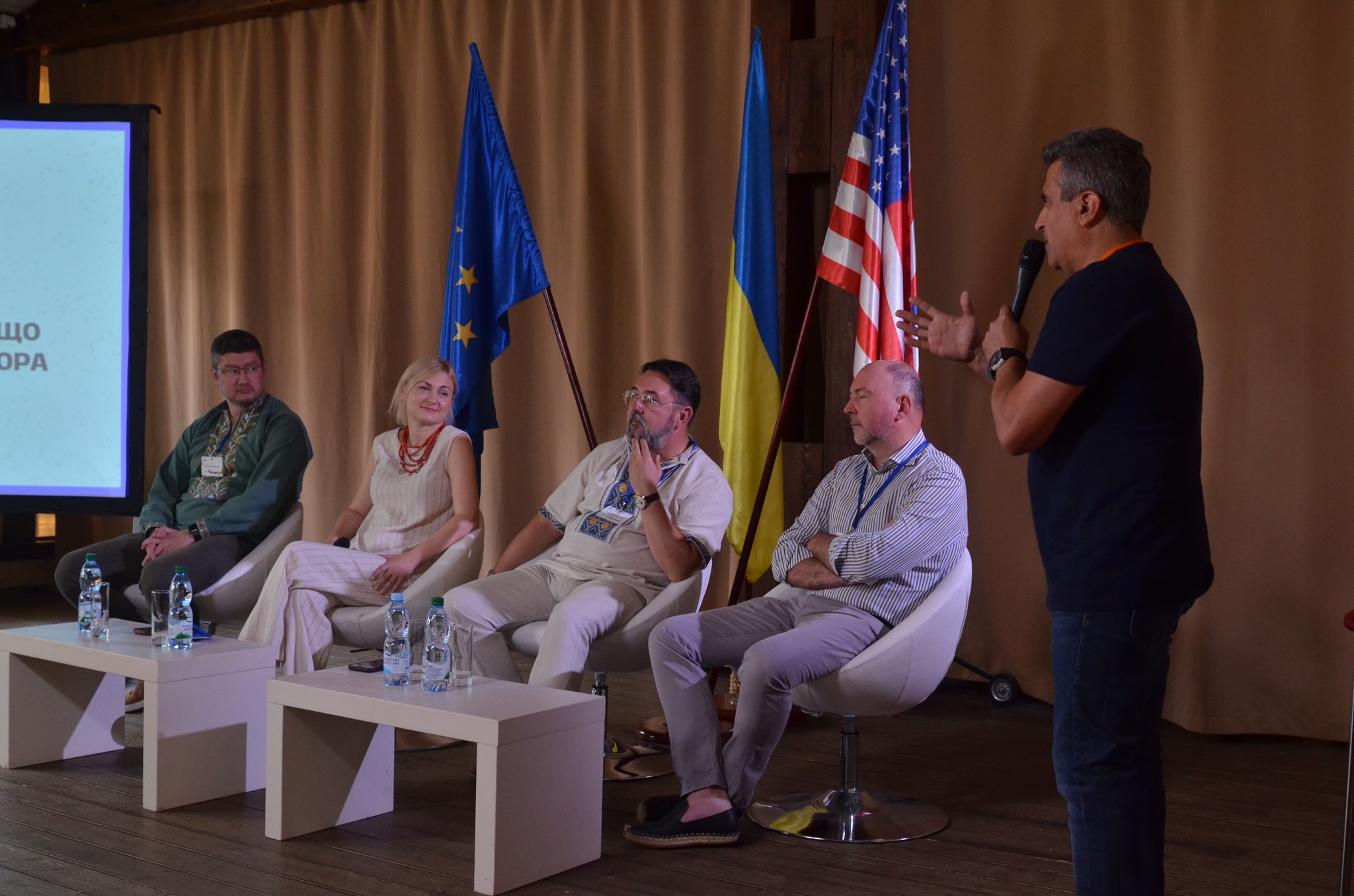
“Not everything can be solved at the level of state restrictions, but it can be solved at the user level. Just as you need to wash your hands after using the toilet or before eating, you also shouldn’t use anonymous Telegram channels. It’s not about the law, it’s about education,” noted Mykyta Poturaiev.
“In the Media Law, we did an important thing: we entered the online dimension. Therefore, now online media have the same regulation as other media. Regarding platforms like Telegram and TikTok, the regulation in the Media Law is quite light, but it will exist and be based on international agreements,” emphasized Oleksandr Burmahin.
“The names of Russian propagandists should not be welcome, that they should not be quoted. Unfortunately, some international journalists still disagree with sanctions imposed on Russian media. The voices of Ukrainian journalists should be heard,” said Yevheniia Kravchuk.
“Sometimes, we need to support our state, not just criticize it. We need to realize that Ukraine is us, and we should help this country. This is the path to victory,” summarized Oleksandr Bohutskyi.
Speaking about the fight in the information space as another dimension of the Russian-Ukrainian war continued within the framework of the third panel on “How to win in information warfare: special dimensions and tasks for tomorrow.” The speakers on this panel included Nataliia Lihachova, editor-in-chief of “Detector Media,” Kateryna Miasnykova, executive director of the National Association of Broadcasters, Kostiantyn Khvurt, chairman of the board of Internews-Ukraine, and Ihor Rozkladai, deputy director of CEDEM.
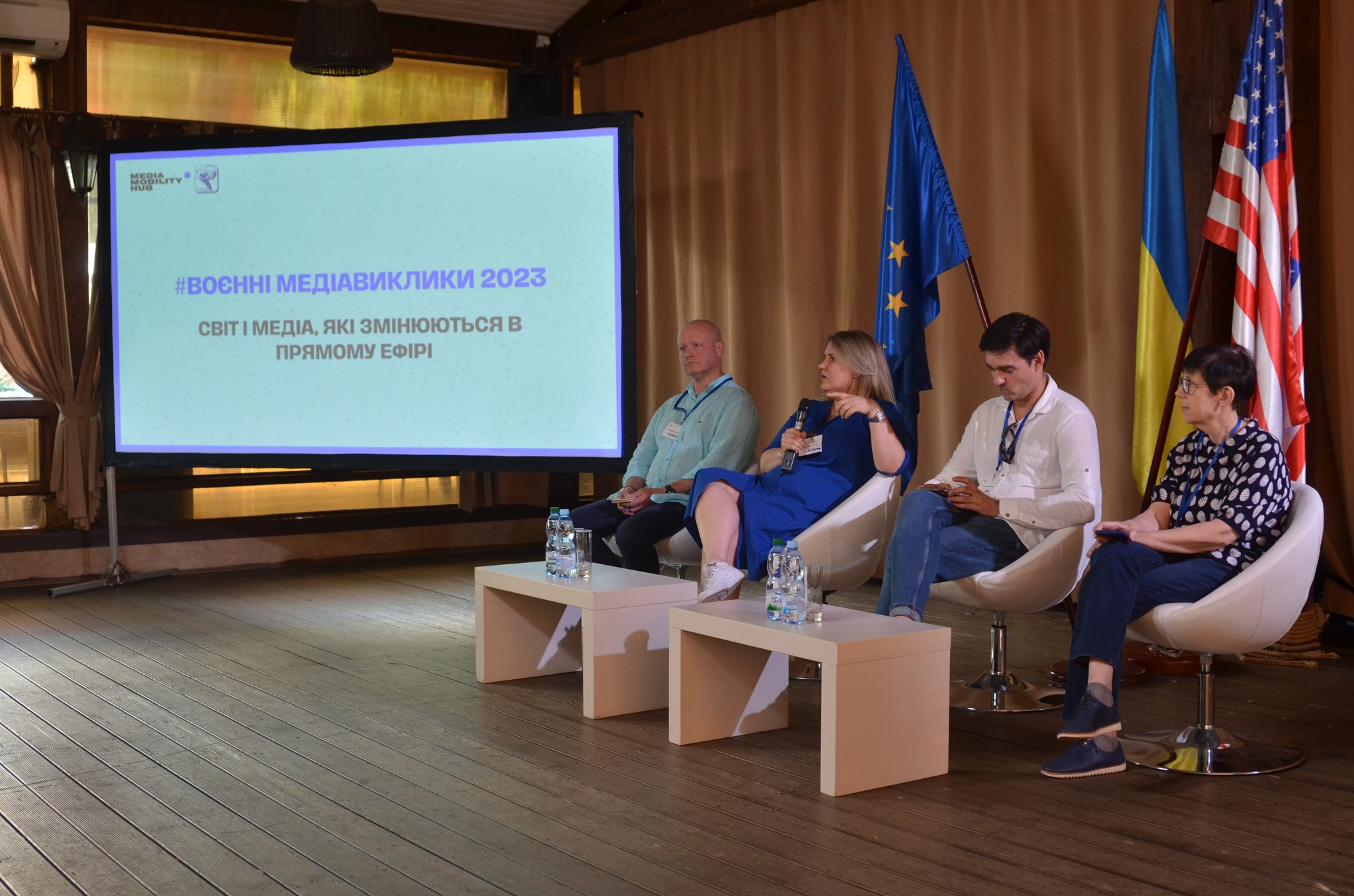
“What are Ukrainian media losing to Russian media? Higher recognizability of media personalities and financial resources for promotion. There’s no point in setting a goal now to influence the Russian audience. This 1% of reasonable Russians won’t change anything. But influencing the Western audience is a very important task for Ukrainian journalists,” emphasized Natalia Lihachova.
She also shared her thoughts on the interaction between the state, media, and society, referring to the previous discussion: “We have too little constructive discussion between the state and citizens. Usually, the state does something weird, which sometimes contains some positive elements, and civil society and the media respond. I believe that the media should be involved in discussing issues that the state has not yet addressed. That is, not just reacting but setting the agenda. We need to talk about the problems of internally displaced persons, various social groups, what is needed for reconstruction, and how to achieve victory. The task of the media is not only to report on the local community but also to articulate issues for the state.”
“What can defeat a tank? Another tank. The state must fight against the state. Placing all the responsibility for victory in the war on businesses, civil society, and the media is not effective,” emphasized Kostiantyn Kvurt.
“To surpass Russian media, we need not to catch up with them but to pause and think about which platforms we can use to convey information. We currently see a trend in ‘real-life’ content on social media. As journalists, we need to fit into this content between coffee and pets and showcase today’s pressing issues,” said Kateryna Miasnykova.
“Media have become dependent on social networks. Even if we ban Telegram, it doesn’t guarantee 100% that people won’t use it. We need to teach people from a young age how to behave in the virtual world,” emphasized Ihor Rozkladai.
From intense and active discussions, we move on to the celebratory part. As is tradition during the Wartime Media Challenges 2023 conference, the “Breakthrough!” award was presented for outstanding achievements in the profession. This year’s laureate was Oleksandr Matiushenko, a journalist from the Mykolaiv TRC MART, and a graduate of the 19th session of the Media Mobility Hub.
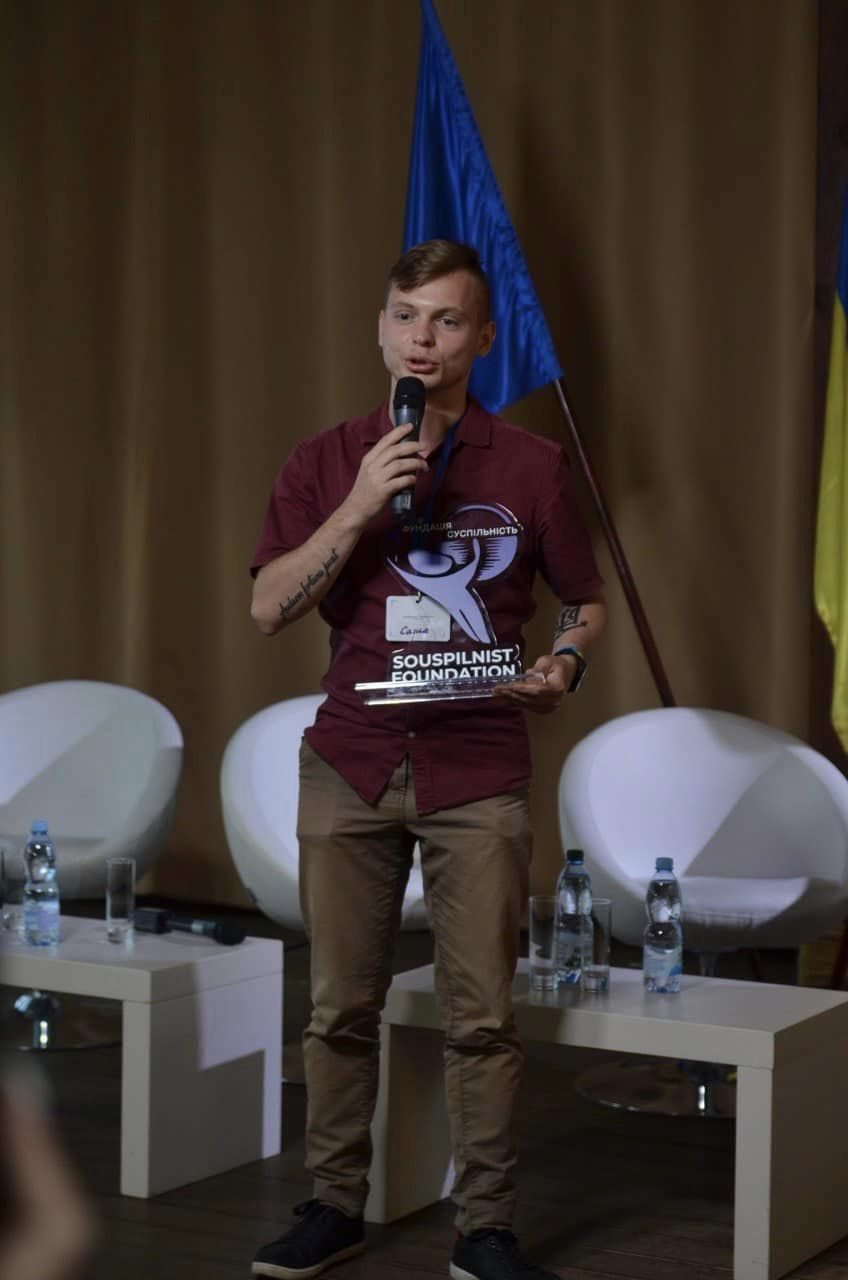
“I want to wish everyone to stay strong and always remember who gives us the opportunity to work. And we must always remember the people in our profession who gave their lives in the name of journalism,” said Oleksandr in his acceptance speech.
The special award for Outstanding Contribution to Journalism in Times of War was presented to the newsroom of Radio Culture. It was awarded to this Radio’s producer Iryna Slavinska.
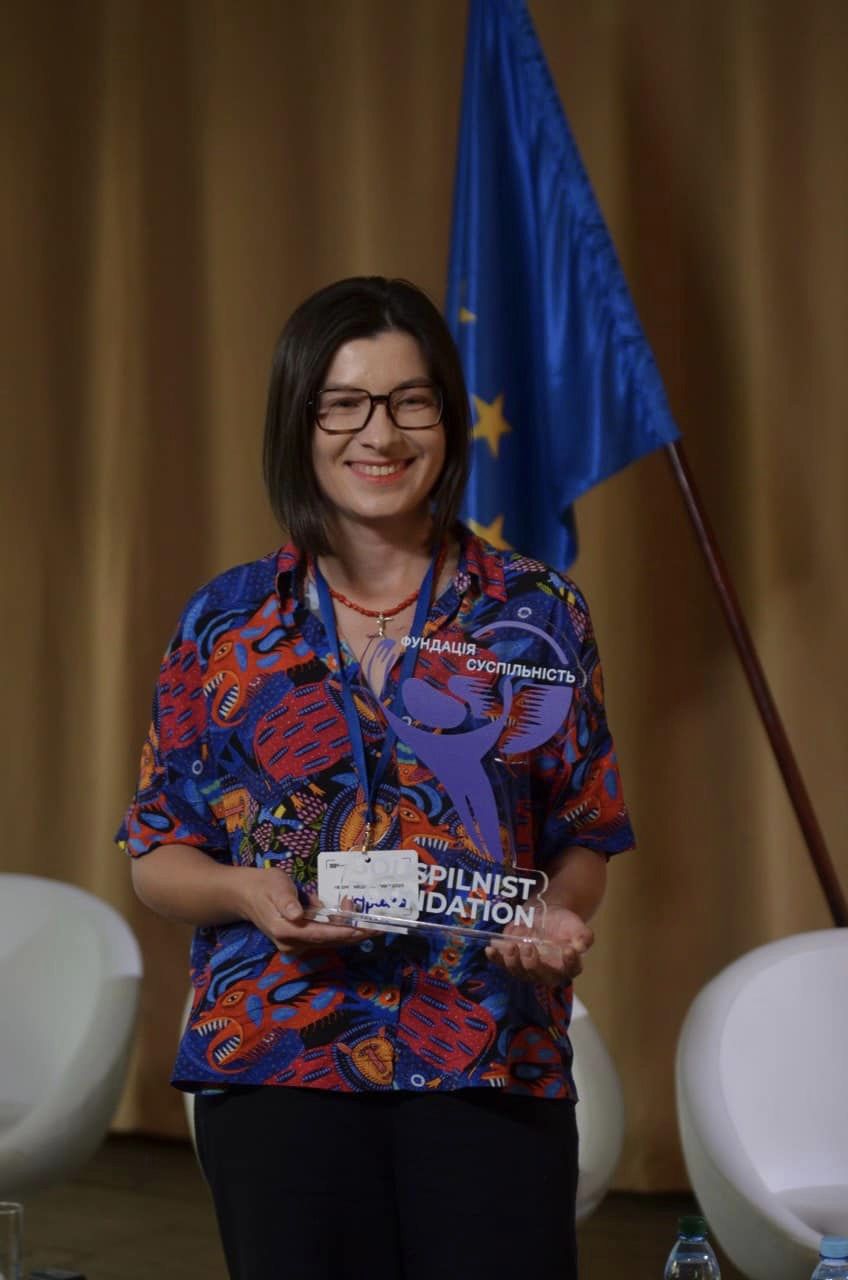
“Asking questions and seeking answers is not an innate skill. Media allows you to develop this skill by learning to ask questions. It’s an opportunity to find ambiguities in the obvious things. Media is the duty to work with uncertainty,” mentioned Iryna in her acceptance speech.
Returning to the panel discussion began with a debate on the topic “The Phenomenon of Public Broadcasting in Ukraine. The Marathon Continues.” The participants discussed what Suspilne is currently going through, how it has been reformed, what is happening with its financing, and how the telethon has affected it. Participants who shared their thoughts included Mykola Chernotytskyi, Chairman of the Board of Suspilne, Svitlana Ostapa, Chair of the Supervisory Board of Suspilne, Khrystyna Havryliuk, Chief Editor of News at Suspilne, Vadym Miskyi, Secretary of the Supervisory Board of Suspilne, and Olha Chervakova, Director of the Department of Interaction with Government Authorities at Suspilne.
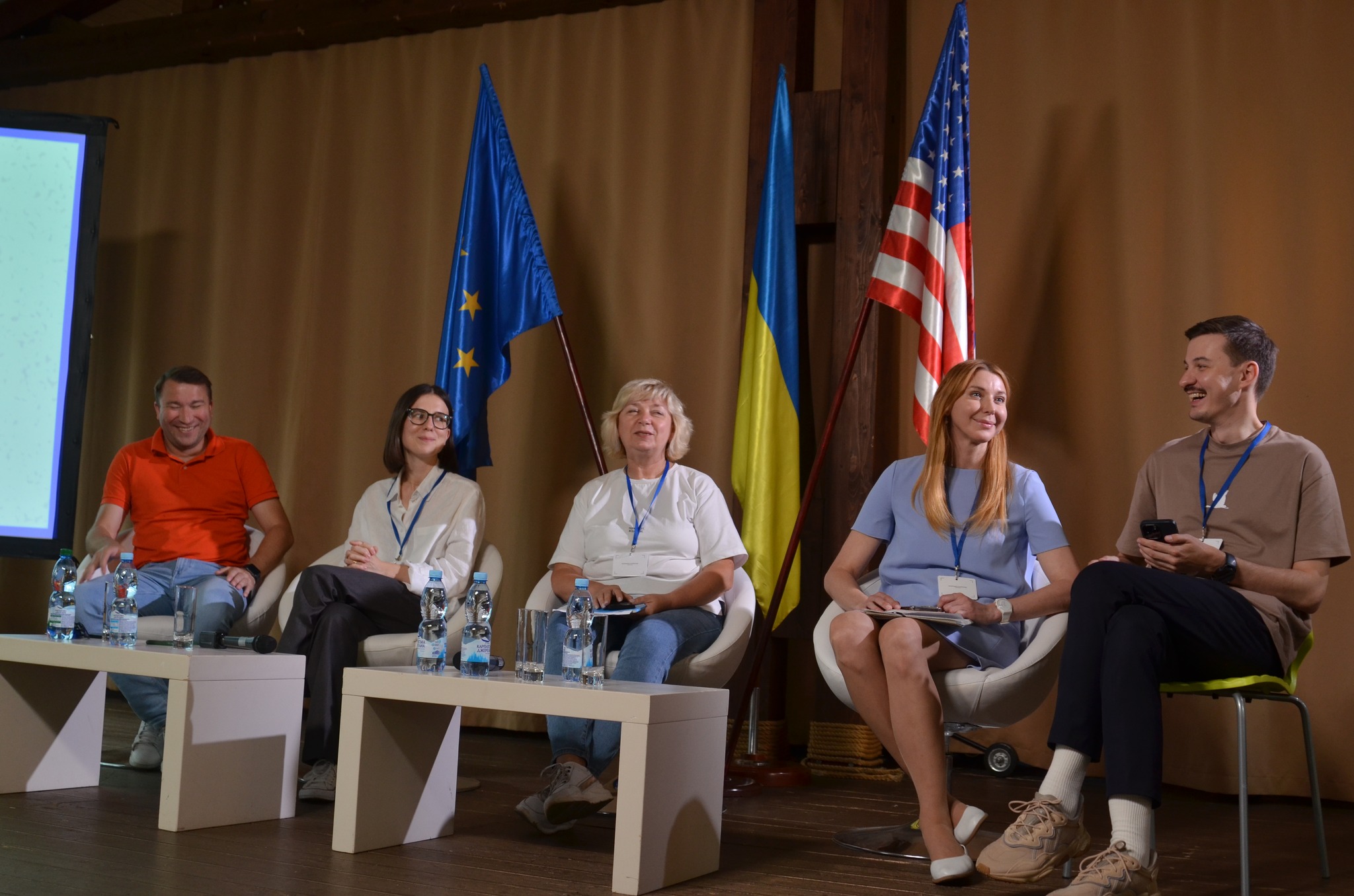
“The reform has taken place, but it is not complete. When you start building a house, you need to decorate it, furnish it, and renovate it. It’s an ongoing story. But I can say that Suspilne has already established itself,” said Svitlana Ostapa.
“People come to the Marathon for information. We are responsible for our time slot; we’re working according to journalistic standards. Our task is to provide residents with maximum information to make decisions. At the beginning of the war, this included survival,” emphasized Mykola Chernotytskyi.
“The work at the Ministry during Tkachenko’s tenure was an attempt to reformat the information flow. I advise young journalists to research history and not to hire people who once allowed Russian narratives. During Tkachenko’s time, this was allowed,” said Vadym Miskyi.
“The reform is still ongoing; we are not yet the media we want to be. We have the potential and ambitions. The war made society understand the importance of public broadcasting in the country. But this is not our ceiling, and we continue to develop,” said Khrystyna Havryliuk.
“Suspilne is the only corporation dependent on state funding. The government tried to discredit Suspilne to justify underfunding. However, it didn’t work because we are people with principles,” emphasized Olha Chervakova.
The last but not least topic for discussion on the first day of the conference was “Ethical Challenges of Journalistic Work in ‘Hot’ Conditions: How to Maintain Trust?” During this panel, questions were raised about how to show the truth to the world without fueling the enemy, how to communicate with people who have experienced trauma, and how not to harm the audience with your material. Advice and practical case studies were shared by Tetiana Liebiedieva, Honorary Chair of the National Media Association and member of the Commission on Journalistic Ethics; Anna Kaliuzhna, journalist at Bihus.info; Maryna Synhaivska, Deputy Director General of the UkrInform news agency and member of the Independent Media Council; and Roksolana Bychai, journalist at Radio Liberty.
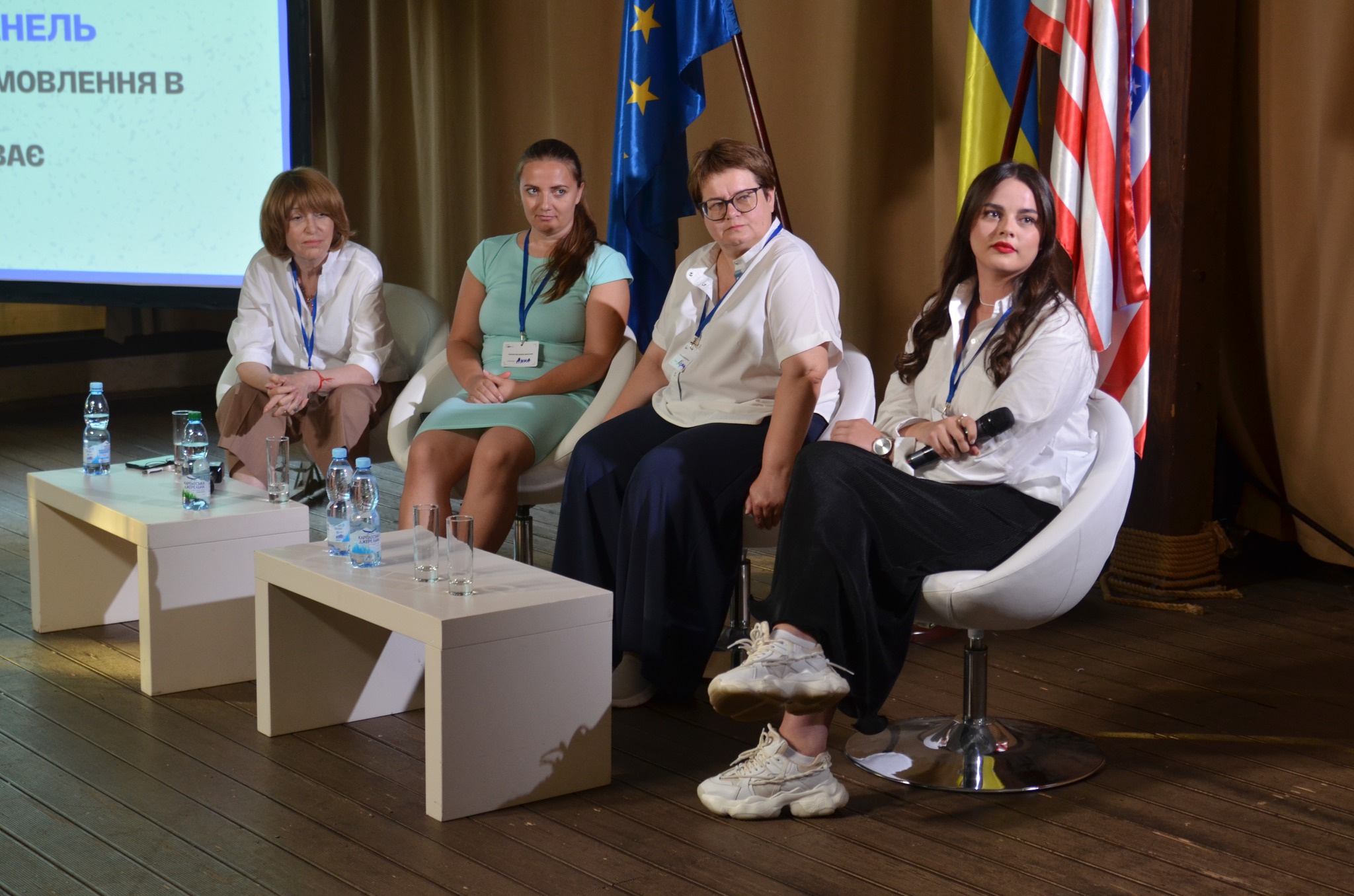 “War, like litmus paper, has highlighted the importance and weight of truthful information and the danger of untruthful, clickbait information. If in the past, an understanding of reality depended on the truthfulness of information, now it affects life, mental health, and a crucial life choice: to leave or not to leave, to evacuate or not. Currently, the price of high-quality information has skyrocketed,” emphasized Tetiana Liebiedieva.
“War, like litmus paper, has highlighted the importance and weight of truthful information and the danger of untruthful, clickbait information. If in the past, an understanding of reality depended on the truthfulness of information, now it affects life, mental health, and a crucial life choice: to leave or not to leave, to evacuate or not. Currently, the price of high-quality information has skyrocketed,” emphasized Tetiana Liebiedieva.
“When covering war, the main thing is not to harm. These are our close ones, and we are responsible for these lives. We cannot ignore investigating corruption during the war. The government’s response is a bit faster now than before the full-scale invasion, but it’s precisely the corruption exposed by journalists. The government needs to regain trust,” noted Anna Kaliuzhna.
“We don’t mindlessly quote foreign media. We analyze, write requests, and then present the information. Our task is not to create hype but to provide information in a way that doesn’t harm anyone. You are responsible for what you transmit,” emphasized Maryna Synhaivska.
“Standards during wartime play a significant role, and you have to check every word. Journalists bear the responsibility to filter even what official sources say,” noted Roksolana Bychai.
Ahead of us, there are even more important and intensive discussions, interesting ideas, and crucial conclusions. We look forward to the second day of “Wartime Media Challenges 2023”!
The text was prepared by Anastasiia Yeriomenko
